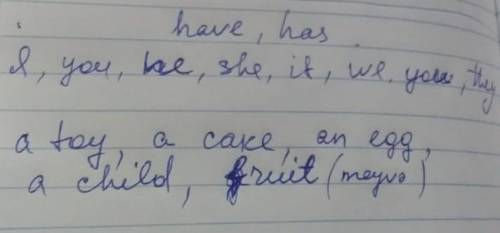
a toy
I/You/We/They have a toy.
He/She/It has a toy.
a cake
I/You/We/They have a cake.
He/She/It has a cake.
an egg
I/You/We/They have an egg.
He/She/It has an egg.
a child
I/You/We/They have a child.
He/She/It has a child.
a fruit
I/You/We/They have a fruit.
He/She/It has a fruit.
Объяснение о 'have/has':Have используется из I, you, we, they
Has используется из He, she, it
Утвердительное предложение:
I, you, we, they/He, she, it + have/has + 
Отрицательное предложение:
I, you, we, they/He, she, it + don't/doesn't + have + 
*Заметьте - неправильно сказать "he doesn't has", например. Здесь на лицо "he" указывает вс глагол "doesn't". Также вы не можете сказать "I have not", только "I have not got" (но тут уже конструкция 'have got')
Вопросительное предложение:
Do/Does + I, you, we, they/He, she, it + have +  ?
?
В отрицательном и вопросительном предложении, если глагол "have", добавляется вс глагол do/does.
Model:Claire: Did you have a nice weekend in Paris?
Nick: Yes, thanks. It was good. We looked around and then we saw a show.We did not try to do too much.
Claire: What sights did you see?
Nick: We had a look round the Louvre. I did not know there was so much in there.
Claire: And what show did you go to?
Mark: Oh, a musical. I forget the name. I did not like it.
Claire: Oh, dear. And Did Sarah enjoy it?
Mark: No, not really. But we enjoyed the weekend. Sarah did some shopping, too, but I did not want to go shopping.
I/You/We/They have a toy
He/She/It has a toy
I/You/We/They have a cake
He/She/It has a cake
I/You/We/They have an egg
He/She/It has an egg
I/You/We/They have a child
He/She/It has a child
I/You/We/They have a fruit
He/She/It has a fruit